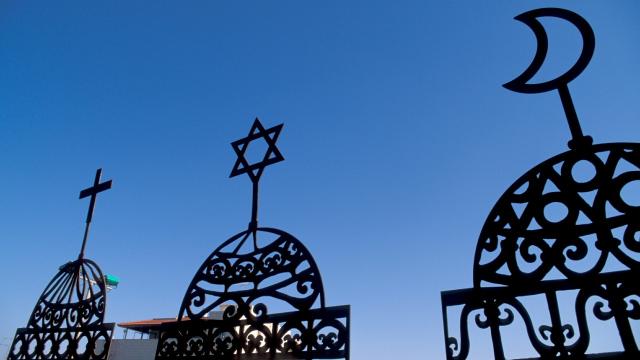This week, the religious discrimination bill is finally being debated on the floor of federal parliament.
The bill has prompted disagreements within political parties, within religions and across a wide variety of other stakeholders.
But what do voters actually think?
A new survey, soon to be published in the Journal of Sociology, shows a majority of Australians do not think religious organisations that provide government-funded public services should be allowed to discriminate against LGBTQ+ people.
The religious discrimination bill
The religious discrimination bill does two key things. First, it protects religious and non-religious people from being discriminated against on the basis of their faith or lack of it. This aim is widely supported.
Second, it allows religious people and religious organisations to discriminate against other people where the conduct is backed by genuinely-held religious beliefs.
As part of this, the proposed bill would permit discrimination in government-funded services such as religiously-affiliated education, aged care, health care and welfare services. This has been hotly debated.
These parts of the bill give religious people new rights to discriminate and reduce protections already available to LGBTQ+ people, people with disability, single mothers, and unmarried couples.
Our research
Colleagues and I recently conducted a study of Australians’ views about the role of religion in government and public life. We included questions in the Australian Survey of Social Attitudes that ran from February to June 2021 with 1,162 respondents.
First, we asked people a general question about whether they agree or disagree that, “the federal government should advocate Christian values”. About one third agreed (37%), one third disagreed (30%), and one third were unsure (32%).
Unsurprisingly, Christians were more likely to agree (57% of both Anglican and Catholic respondents), and those with no religion were less likely to agree (20%). Coalition voters were more likely to agree (62%) than those identifying with Labor (29%) and those with no party affiliation (31%).
Discrimination against LGBTQ+ people
We also asked how Australians regarded discrimination against LGBTQ+ people by or within faith-based service provision.
We asked whether people agreed or disagreed with the statement: “conservative Catholic, Anglican, Jewish, and Muslim schools should be allowed to refuse to employ a teacher because they are LGBT+”.
The vast majority (73%) of those surveyed disagreed, 19% agreed, and 8% were unsure. Only 17% of women agreed compared to 22% of men.
Most respondents also did not see discrimination against LGBTQ+ teachers as a “Christian value”.
Only 20% of Catholics agreed, 25% of Anglicans, and 35% of other Christians. Among Australians who attend religious services at least monthly, less than half (41%) support discrimination against LGBTQ+ teachers within conservative religious schools, and only 25% support discrimination against an LGBTQ+ homeless person by a religiously-affiliated welfare organisation.
Only one quarter (26%) of those who identify with the Coalition support discrimination against LGBTQ+ teachers, even though 62% want the government to advocate Christian values. This suggests that many see discrimination as inconsistent with Christian values.
A similar pattern appears among those who identify with Labor. While 29% want the government to advocate Christian values only 14% support discrimination. Only 19% of those with no party affiliation support discrimination.
Our analysis suggests support for discrimination is more influenced by whether a person has religious beliefs which justify discrimination rather than their political affiliation.
Taxpayer funds are involved
Religious organisations receive billions of dollars of public money. They also employ tens of thousands of people to provide services to the general population. For example, approximately one third of schools in Australia are faith-based schools and Anglicare Sydney alone received more than A$240 million in government subsidies in both 2020 and 2021.
Other research demonstrates permitting discrimination causes serious harm. For example, a 2006 Jesuit Social Services study found discrimination in Catholic schools toward same-sex attracted young people resulted in “increased rates of homelessness, risk-taking behaviour, depression, suicide and episodes of self-harm compared to young heterosexuals.”
Our research suggests the majority of Australians strongly reject the sections of the religious discrimination bill that would allow discrimination by government -funded bodies in the name of religion. This is true for Coalition voters and religious Australians.
As MPs debate this complicated and controversial bill – which has many, diverse stakeholders – they should also be considering the views of the broader Australian community.![]()
Douglas Ezzy, Professor of Sociology, University of Tasmania
This article is republished from The Conversation under a Creative Commons license. Read the original article.

Leave a Reply
You must be logged in to post a comment.